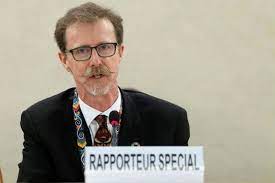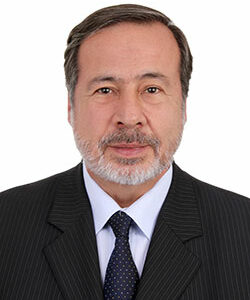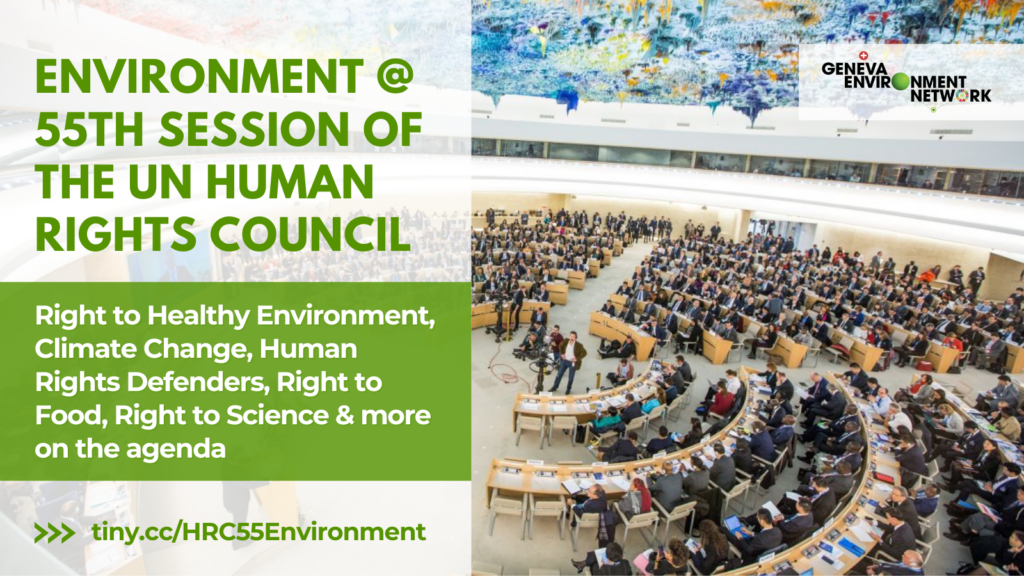Event Conference
Business, Planetary Boundaries, and the Right to a Clean, Healthy and Sustainable Environment | HRC55 Side Event

05 Mar 2024
16:00–17:00
Venue: Palais des Nations | Room XXV
Organization: Special Procedures of the UN Human Rights Council
This side event to the 55th session of the Human Rights Council will discuss the thematic report of the Special Rapporteur on human rights and the environment on "Businesses, planetary boundaries, and the right to a clean, healthy and sustainable environment".
About this Session
The recognition of the human right to a clean, healthy and sustainable environment through UN resolutions has been a historical breakthrough for the people and the planet. In addition, five decades of environmental laws and policies regulating businesses have achieved some important successes, such as the protection of the stratospheric ozone layer from harmful chemicals, advances in protected areas, and the exponential growth of renewable energy.
However, the planetary crisis is getting worse and constitutes the biggest threat to human rights ever faced, because it threatens the rights of everyone alive as well as the rights of future generations. Environmental progress is overwhelmed by the inexorable growth in production, consumption and population. Decades of unbridled business activity in pursuit of profit and growth have exacerbated inequality, left billions behind, and pushed civilization to the precipice of disaster.
Businesses have the responsibility to respect human rights, including the right to a healthy environment. However, businesses practices around the world have resulted in negative human rights impacts by polluting air, water and soil, causing and exacerbating the climate crisis, devastating biodiversity and ecosystems, producing and marketing unhealthy and unsustainable food, and releasing toxic substances.
Transformative changes to economic and business paradigms are urgently needed to reduce humanity’s collective impact on nature and the associated human rights impacts. In this regard, States and businesses have a critical role to play in supporting society’s quest for a just and sustainable future.
The Special Rapporteur on human rights and the environment dedicated his thematic report to the 55th session of the Human Rights Council to the topic of Businesses, planetary boundaries, and the right to a clean, healthy and sustainable environment. In this report, he evaluates the inadequacies of voluntary normative frameworks for ensuring that businesses respect human rights and clarifies State obligations to protect the right to a clean, healthy and sustainable environment from harms caused by businesses. The Special Rapporteur concludes that systemic and transformative changes are needed to achieve a just and sustainable future and provides extensive recommendations for States.
This side event will discuss the thematic report of the Special Rapporteur, including in the context of the implementation of the right to a healthy environment as recognized by Human Rights Council Resolution 48/13 and General Assembly resolution 76/300, and to address issues including the following:
- The impact of businesses on the right to a clean, healthy and sustainable environment;
- States obligations to protect the right to a clean, healthy and sustainable environment from harms caused by businesses and good practices, gaps and challenges relating to these obligations;
- Business responsibilities to respect the right to a clean, healthy and sustainable environment and good practices, gaps and challenges relating to the normative frameworks in place;
- The role of key actors including governments, businesses, the United Nations, civil society, Indigenous Peoples, local communities and youth;
The recommendations provided in the report both at the national and international levels and ways forward.
Speakers
By order of intervention.

H.E. Amb. Smiljana KNEZ
Ambassador-at-Large for Climate Change, Slovenia

David BOYD
UN Special Rapporteur on human rights and environment

H.E. Amb. Gustavo GALLÓN
Permanent Representative of Colombia to the UN office and other international organizations in Geneva

Andrew PRAG
Managing Director for Policy, We Mean Business Coalition

Joie CHOWDHURY
Senior Attorney, Center for International Environmental Law

Anouska PERRAM
Senior Counsel, Forest Peoples Programme

Diana RIZZOLIO
Coordinator, Geneva Environment Network | Moderator
Highlights
Summary
Opening Remarks
H.E. Amb. Smiljana KNEZ | Ambassador-at-Large for Climate Change, Slovenia
- For the promotion of the human right to a clean, healthy and sustainable environment in the business context, a solid legal, national and international framework is a foundation. This is not enough: key principles of good governance — transparency, disclosure, rule of law, anti-corruption efforts — are key building stones for the efficient implementation of the right in the context of businesses, as well as evidence-based approach, reliable information, space for civil society, protection of human rights defenders, awareness raising in human rights education and training.
- We also witness a growing body in customary law. Litigations are influencing corporate behavior and might advance action on climate change and human rights, although there are still barriers.
- Highlighting two aspects of the right to a healthy environment in the context of business:
- Outsourcing of environmentally-destructive business activities to low- and middle-income States where protection of human rights and environment are weaker or not enforced. In the global effort to a green transition, there is a strong temptation to continue with such practices.
- Rights of women and girls are routinely abused by promoting harmful stereotypes and polluting air and soil.
- In Slovenia, the first national action plan on business and human rights was adopted in 2018, and the second edition in 2021.
- Slovenia is also one of the first in the European Union (EU) to make green public procurement mandatory.
- The country also supports the proposal for a new EU directive on Corporate Sustainability Due Diligence, and still hope for its adoption. It will significantly reshape corporate due diligence obligations regarding human rights and environmental standards in the EU and beyond.
- We believe it is necessary to transform the existing economic paradigm. Human rights and the environment must take precedence over profit.
- The adoption of mandatory measures for the most influential companies can and might prevent human rights abuses and depletion of our planet for economic interests. We advocate for a socially responsible and ethical economy with a just transition that respect human rights while promoting sustainable development.
Panel Discussion
David BOYD | UN Special Rapporteur on human rights and environment
- The scientific evidence of the environmental planetary crisis grows stronger by the day. We are slowly exceeding planetary limits. This crisis is also an environmental crisis. In my various country visits, what we’re seeing is that the planetary crises are making lives more difficult, as it increases water scarcity, food scarcity, and human-wildlife conflict.
- In this report that focuses on the contributions of businesses to the crisis, we learned that businesses, especially large ones, are major contributors, as they use our environment as a dumping ground for massive volumes of air, water, and soil pollution, huge climate greenhouse gas emissions, damaging biodiversity, and poisoning people, wildlife and ecosystems.
- We have the UNGP on business and human rights, but it’s a voluntary framework. Frankly, it’s not getting the job done. This connects to the heart of the report: States have a fundamental obligation as duty-bearers to regulate and ensure businesses respect the climate, protect the environment and respect human rights.
- This requires systemic and transformative changes because today’s economic system is based on the exploitation of people and nature.
- The report has short-term recommendations which States can and should be doing, including:
- Human rights and environmental due diligence legislation at the national and regional level, particularly in countries in the Global North where the majority of large businesses are headquartered.
- Rights-based climate and environmental laws, standards and regulations. Rights-based because rights are catalysts for actions, clarify duties and responsibilities of States and businesses, and put the focus on populations in situations of vulnerability and marginalization.
- Systemic and transformative changes mean rethinking the paradigm that measures progress by increasing economic growth.
- On a finite planet, we cannot have infinite economic growth. We need to replace GDP with holistic measures of development (e.g., buen vivir, gross national happiness, etc.)
- We need to put a price on environmentally destructive activities. Hundreds of billions of kilograms of toxic substances are being dumped into the environment free of charge by businesses around the world. This cannot continue. States provide more than a trillion dollars to subsidize such activities. We need to redirect these to environmentally sustainable and restorative activities.
- Business models based on maximizing short-term profits for shareholders are impossible to reconcile with an equitable and sustainable future. We need to shift business paradigms and look into benefit corporations as an alternative model. Benefit corporations are those driven not by short-term considerations for shareholders but by a mandate to provide societal benefits.
In a world that is finite, we have to recognize that wealthy countries have to reduce their ecological footprints, as there are billions in the Global South who are more in need for this energy to attain a decent standard of living and enjoy their human rights.
H.E. Amb. Gustavo GALLÓN | Permanent Representative of Colombia to the UN office and other international organizations in Geneva
Colombia has played a leading role with regard to the right to a healthy environment. Art. 79 of the Constitution adopted 33 years ago established this right at the national level. In this three decades, Colombia has implemented all kinds of mechanisms for the protection of the environment while actively working towards global solutions to the triple planetary crisis.
Our experience has also taught us three lessons.
- Most environmental issues faced by countries in the Global South were not created by them and cannot be solved by them. This is the case for the climate emergency, which has affected a variety of human rights. The effects of climate change are not experienced in uniformity in all countries; the Global South is more vulnerable to its effects which puts future generations at risk. Solutions can only be achieved through global action, and particularly with the commitment of those with the greatest historical and current responsibility for greenhouse gas emissions. This is why Colombia has been raising the need for reaching decarbonized economies through energy transition that fundamentally integrates environmental and social justice at its core.
⠀ - The commitment to the right to a healthy environment cannot be limited to our national jurisdictions. Our country and many others in the Global South are home to raw material extraction operations of various multinational companies. Colombia has welcomed them with open arms and has continued to encourage the growth of foreign investment. We would continue to ensure that they have what they need to operate smoothly. However, it is also true that some of these companies have significantly polluted the environment in Colombia and many countries in the Global South. While tools such as the UNGP on Business and Human Rights and OECD Guidance for Multinational Enterprises have been valuable in setting clear standards for responsible business conduct, the nonbinding nature has limited the universal application and has reduced their actual impact.
What is more disturbing is that many of these multinationals originate from countries where the right to a healthy environment is widely guaranteed in the national territory but which exercise nearly no control over their multinationals and their operations in the Global South. This constitutes an outsourcing of pollution and creates a two-tier system in which the right to a healthy environment is guaranteed for developed countries at the expense of the enjoyment of the same rights of citizens of the developing world.
- On the global economic system. While Colombia has faced important problems of protecting the environment and ensuring compatibility between economic activity and human and ecosystem health, we have been disappointed that some of these measures have been challenged in international investment disputes. My country, like many others, has to make the difficult choice between protecting the human right to a healthy environment and protecting foreign investors. This dichotomy should not exist.
Human rights should not be conditioned by economic interests of private actors. This illustrates what lies at the heart of the debate of the international economic system. We believe that economic growth should not be prioritized over the protection of the environment because without it, there will no longer be any humanity to enjoy the benefits of economic growth.
Joie CHOWDHURY | Senior Attorney, Center for International Environmental Law
Given the outsized contributions of a relatively small number of corporations in driving the triple planetary crisis and consequent human rights violations, it will be impossible to realize the right to a clean, healthy and sustainable environment if States do not and are not in a position to effectively prevent business enterprises from abusing this human right to effectively regulate corporate environmentally-destructive conduct. Such conduct has two distinct facets: physical and social drivers of the environmental crisis.
- Physical activities such as dumping chemicals and toxic waste, or the generation of greenhouse gas emissions, or activities that generate extensive pollution, the destruction of biodiversity and fragile ecosystems that drive the climate emergency, all leading to devastating public and planetary harm.
- Business conduct also contributes to the violations of the right to a healthy environment, to the pervasive sociopolitical activities of companies, such as corporate capture that obstructs regulations, denies the science, deceives the public, and delays necessary action.
It is excellent to see in the report that both aspects of corporate conduct in relation to State obligations have been addressed because addressing both is imperative to effectively regulate planet-wrecking corporate conduct. What are these State obligations then?
- States have clear legal duties under international law to prevent violations of the right to a clean, healthy, and sustainable environment, related human rights harm, and other foreseeable harm. This also entails due diligence obligations with international law requiring a stricter standard of due diligence for riskier activities.
- Particularly under the duty to protect the rights of present and future generations, human rights law requires States to refrain from supporting environment-destructive business enterprises, adequately regulate it, and guarantee effective remedy for violations domestically and extraterritorially.
- States must also regulate industry conduct that impedes environmental and climate action. There are several legal bases to do so, from regulating and addressing various types of corporate misinformation and misrepresentation to making relevant information across supply chains and prohibiting conflict of interests in environmental policymaking.
- States must align with clear legal obligations to do everything they can to protect environmental human rights defenders who are under relentless attacks and are being martyred at unprecedented rates, and more broadly protect civic space. If legitimate channels of societal engagement shut down at this very critical juncture, we lose the power to make transformative change that can only come from us working together across society.
How are these norms working in practice?
- There is promise. There are clear legal norms and victories against transnational companies such as Shell and Chevron. But laws, in and of themselves, are not enough. We need more effective enforcement of existing laws and more political will.
- If we look at normative frameworks, voluntary frameworks are not cutting it. We need more binding laws. There is a treaty on business and human rights that has been negotiated for years and has not yet been adopted. We are very far today from meaningful corporate accountability, and this is rooted in corporate capture.
- Companies continue with environment-destroying activities often with a level of impunity that is difficult to reconcile with what the science is clearly telling us. As the Special Rapporteur makes clear and as the IPCC has repeatedly warned, not halting this type of activities will have existential stakes.
Andrew PRAG | Managing Director for Policy, We Mean Business Coalition
- We Mean Business Coalition represents the most ambitious businesses in terms of action on climate in particular, either through their own actions or through the influence they have on policies and supply chains.
- The report highlights, “As the planetary crisis worsens, it is clear that the dream of voluntary corporate social and environmental responsibility is dead.” That was never the dream that should have been because voluntary processes exist and are alive and well. They are allowing leading companies to go further to step up, but what we need to bring up the floor for the millions of businesses that are not acting in accordance or creating negative damage, is policy regulation and framework through the right balance of carrots and (enforceable) sticks.
- For voluntary companies, we need to make sure that the guidelines and processes used are exhaustive and with high integrity as possible, including the OECD Guidelines as well as the processes established by the network of businesses themselves.
4 As of corporate leadership that can guide companies.
- Ambition. Setting long-term science-based targets, covering all emissions not only in their own operations but across the supply chain and the impacts of their products.
- Action. Setting an ambition is nothing without action behind it. A good practice is to publish detailed climate transition action plans that embody the full transition of their business models and operations, including through engagement with suppliers (whether on emissions or human rights impacts) and making sure just transition is fully embedded in their transition plans as businesses have a responsibility not only to their workers but the communities they impact.
- Accountability. Disclosure, disclosure, disclosure. Making sure companies are transparent.
- Advocacy. This is where business leadership and policy regulation meet, in terms of what impacts businesses can have on policies, especially if they push for positive policies. Responsible policy engagement.
Anouska PERRAM | Senior Counsel, Forest Peoples Programme
- The human rights violations faced by Indigenous Peoples and traditional communities (in forest areas) are closely correlated with violations of the right to a clean, healthy and sustainable environment. There are two broad types of examples of violations:
- When Indigenous Peoples’ lands are taken from them due to large mining developments or agribusiness infrastructure, among others, which all feed the global economy. These also have enormous damage to the environment and to people who rely on this environment.
- Less obvious, but a clear violation of the right to a clean, healthy, and sustainable environment is when Indigenous Peoples are evicted from their lands in order to make way for carbon credits to make way for conservation projects into carbon credits to sell to the private market. This therefore deprives them access to their own right to a healthy environment and leading to conditions of squalor in the outskirts. This is a problem that need to be considered when we discuss environmental issues.
- Are the current standard normative frameworks enough? Clearly not.
- In terms of the general issue, these are not binding. Not enough companies are adopting and implementing them. Accountability systems have not yet been materialized either. There has also been too much focus on the process rather than outcomes. At the end of the day, we need human rights outcomes. They are also poorly defined in terms of downstream actors and how these are applied across time.
- In terms of the right to a healthy environment, there isn’t at the moment sufficient integration of key principles in environmental law such as the precautionary principle, which really need to start forming part of business considerations of human rights under this right. Moreover, as a whole, UNGPs focus on businesses in isolation. But when we think about the environment, we need to think about cumulative impacts — it’s not just about what one business is doing but what all businesses are doing. From the limits to growth, planetary boundaries, to requirements for economic and environmental justice, we cannot focus on the individual business model, but looking at it as a whole.
- In this light, the bold and forthright report is timely and needed.
Open Discussion
David BOYD
- The critical need to lift the floor is necessary. There are some businesses that are leaders, and we need to acknowledge that. However, the shocking findings from researching for this report is that there are not just a few bad apples. These are systemic problems across swathes of industries that have taken place over decades — from tobacco, lead, asbestos, pesticides, motor vehicles, to fossil fuel industries… These industries have consistently lied about the adverse health and environmental impacts of their products for decades. They lie about the science for decades.
- It’s amazing to see that scientists from Exxon more than 50 years ago predicted that levels of carbon dioxide in the atmosphere in 2020 will be 420 ppm. 50 years later, they hit the nail on the head. Businesses then lied consistently for decades.
It’s not just a few bad apples. It’s a systemic problem that requires a systemic solution.
— David BOYD, Special Rapporteur on the human right to a clean, healthy and sustainable environment
Ben SCHACHTER, OHCHR
Q: One of the things we have been thinking about since the Human Rights @ 75 commemoration is the issue of accountability for environmental harm. Can we have some reflections on potential mechanisms for enhancing accountability? What is the ongoing discussion about the international crime of ecocide and its potential recognition?
Q: HRC Resolution 51/35 on nuclear testing in the Marshall Islands asked the Office to provide guidance on using elements of transitional justice to respond to the situation. In carrying out this work, it will also be interesting to apply this to the broader context of environmental harms, noting the complexity of discussions of truth and responsibility, particularly when it comes to the business sector. Would you have thoughts or ideas on potential approaches?
Lia Torres, Asia Pacific Network of Environment Defenders & Center for Environmental Concerns
Q: What can we do when our governments allow these businesses allow and promote environmentally-destructive activities? For example, in the Philippines, large-scale mining is still abound, coal-fired power plants allowed, and large dams are still seen as the solution to the climate crisis.
Q: What can we do when communities oppose businesses that cause environmentally-destructive projects, and communities are attacked for doing so? In the Philippines 270 environmental defenders have been killed in the past 3 years, and it is not declining.
Q: What can we do to support reports of UN Special Rapporteurs (and have governments follow the recommendations)? We had two SRs visit the country and their findings show the continuous attacks on environmental defenders.
Andrew PRAG
- Businesses can put pressure on their supply chain so that the right due diligence is being done. Using this influence across the supply chain can lead to normative frameworks and policies (such as the EU Corporate sustainability due diligence). These can help make this universal and “lift the floor” for the private sector.
Joie CHOWDHURY
- On reparations, there are many laws and legal domains, but there are longstanding duties under public international law on reparations. For example, under the State responsibility law, if international wrongdoing can be established, this can lead to legal consequences to cease the wrongful conduct and provide full reparation. Under ICJ case law, this includes States regulating private actors that may have caused environmental harm. There is a rich tradition of accountability and reparations in the international legal domain. There is also a stream of cases on corporate regulations for climate harm, including cases against Holcim and RWE.
- The transitional justice domain is also interesting to look at mechanisms for reparations.
Closing
David BOYD
- What I’ve learned in my country visit to Slovenia is that there is a strong chapter in the criminal law on environmental crimes, and there is substantial implementation of the measures and provisions on the matter. The international conversations on ecocide and adding this as a fifth international crime to the Rome Statute have been having positive conversations at the national level. There are States in all parts of the world that are incorporating ecocide into environmental law (such as Chile and Belgium).
- The challenge, however, is that the implementation is lacking. The UN Environment Programme has been promoting environmental rule of law, which ensures institutions, responsibilities are in place so that the laws on paper are translated into practice. This is a daunting task.
- It is also important to discuss money. To make the systemic and transformative changes needed is going to cost a lot of money. However, the benefits will also just be as much. Six international businesses in oil made net profits of 361 billion dollars in 2022 alone. In COP28, countries were proud of operationalizing the loss and damage fund, at 700 million dollars.
- If we are to move forward, we need to find a way to change this system that results in absolutely mind-boggling profits for corporations that are themselves responsible for the climate emergency that we find ourselves in. The money is there but they just need to go into a different direction.
- This is also why progress has been slow: corporations have great political and economic power. They misuse this to delay human rights-based climate and environmental actions that we so desperately need.
- What to do when your own governments are allowing and promoting environmentally destructive activities? We have to use every tool in the toolbox: citizen action, lawsuits, lobbying, bringing stories to the international arena. Some of the solutions we have talked about such as laws on corporate due diligence will be important, particularly in countries where a lot of international companies are headquartered.
- What to do when environmental human rights defenders are under attack? This is one of the most troubling situations I have come across. The UN has a declaration on human rights defenders. The UN Human Rights Council has a resolution on environmental human rights defenders. However, the horrific things we see to people on the ground have not changed. There are initiatives underway led by different processes, but we need to collectively say, “Enough is enough.”
- How do we support the work of Special Rapporteurs? There’s a funding crisis in the UN, which has detrimental impacts on their work. We also need the help of civil society in helping get the word out.
- This is really quite a disturbing journey on how pervasive and negative the impacts of businesses are on human rights and the environment. A Canadian mining company that brought a case on a massive open-pit mine in a very sensitive ecosystem in Colombia, through the Investor-State Dispute (ISDS) Mechanism. The company filed under a recent agreement that States negotiated with express intent to increase regulatory space to protect the environment and human rights. The arbitration panel that decided on the case ignored what the Canadian and Colombian governments have said, and sided with the foreign investor. This is an absolutely insane system that prioritizes foreign investors over human rights, climate and the environment.
We have to move away from these systems that block climate and environmental action, and start putting human rights ahead of shareholder profits, communities ahead of companies, and children ahead of CEOs.
— David BOYD, Special Rapporteur on the human right to a clean, healthy and sustainable environment
Video
Environment @ HRC55
The 55th regular session of the Human Rights Council (HRC55) is taking place in Geneva and online from 26 February to 5 April 2024. This regularly updated page highlights the environmental-related activities of this session.
Photo Gallery
Links
- UN Special Rapporteur on human rights and the environment
- 55th Regular Session of the Human Rights Council (HRC55)
- Human Rights and the Environment | GEN
Photo Credit © Garth Lenz



















